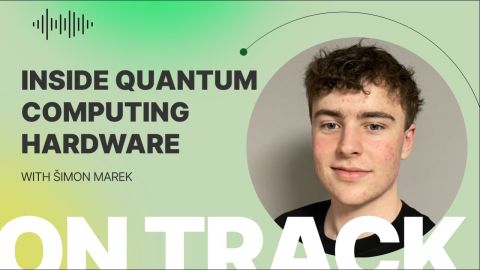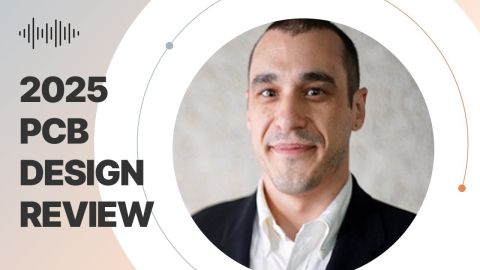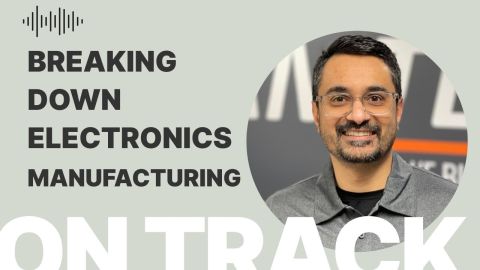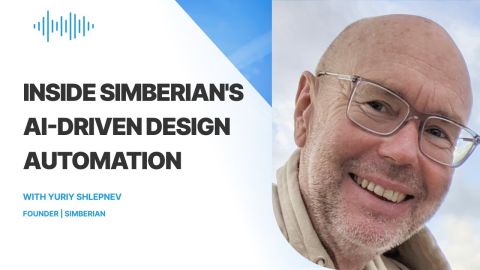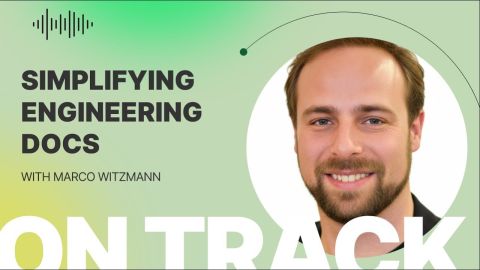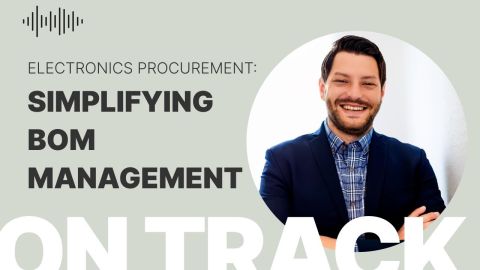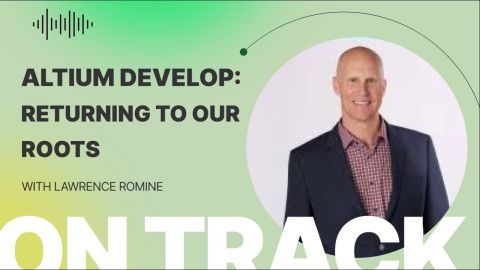Landing a Full-Time Engineering Career at NASA

This episode will learn how a childhood dream can turn into reality through hard work, determination, and networking. Andrew Hartnett dreamt of working with NASA at a very young age. He will share with us exactly how he landed his Computer Engineer position in this very sought-after agency.
Listen to the Podcast:
Download this episode (right click and save)
Watch the video:
Show Highlights:
- Andrew’s background, from his 3rd-grade drawing and high school robotics team to landing a co-op internship program at NASA’s Johnson Space Center (JSC)
- He joined The First Robotics Team in high school
- A lot of networking and determination is what helps him land the co-op internship program
- He started working full-time in January 2010
- Briefly discuss Upverter and the benefits of having high-school level educational programs for aspiring PCB designers
- What is NASA’s co-op internship program? Andrew describes the advantages of the co-op program over a typical internship
- Get exposure to things you don’t get at school
- Experience designing and actual assembly of PCB
- Andrew talks about electronic design standards at NASA and shares details about testing, reliability, and the challenges of sending electronic devices to the space
- Addressing devices’ heat, and vibration in space
- Andrew talks more about First Robotic Competition and stresses the importance of hands-on experience for high school kids or younger
Links and Resources:
Visit NASA’s JSC website
Learn more about JSC’s Internship Program
Making electronic design easy, visit Upverter's website
Register at Altium Education for Free
Altium Designer Free Student License
Connect with Zach on LinkedIn
Full OnTrack Podcast Library
Altium Website
Download your Altium Designer Free Trial
Learn More about Altium enterprise solutions
Claim the special offer for Podcast listeners only
Andrew Hartnett:
They kind of put it together and they knew that if we really want to sell this project and we want to get funding for it, we need to show it to an astronaut first, because once an astronaut sees that they could have it, they're going to be saying, yes, we need that, we need that and constantly hounding the project management and the budget people of, what do you guys need to do to make that happen? We want that.
Zach Peterson:
Hello everyone, and welcome to the Altium On Track podcast. I am your host, Zach Peterson. Today, we are talking with Andrew Hartnett, a computer engineer at NASA about all things design, education, electronics education, and some of the interesting work that he does working at NASA, as well as something that he participated in called The First Robotics Competition. This is all going to be very interesting. Andrew, thank you so much for joining us on the On Track podcast.
Andrew Hartnett:
Thank you for having me. I'm excited to be here.
Zach Peterson:
Absolutely. Absolutely. Working at NASA is, I think, for many young men of my generation, was always a dream when you were in the single digit age group.
Andrew Hartnett:
And throughout some double digit age groups in there too.
Zach Peterson:
That's fair. Yeah, definitely, and you're actually doing it. That's pretty cool.
Andrew Hartnett:
Yeah. Actually a fun story about that. In third grade we had to design something. For third grader to design something, it was just color it with some colored pencils or something, and I still have what my design was, which was the quicker space junk picker-upper, not from Bounty, if you remember the quicker picker upper. Yeah. I remember even in third grade hearing about space junk floating around and how it's going to be a problem someday. Little third grader me thought, okay, well obviously we just need a little claw and a bag and just go and collect all the space junk.
Zach Peterson:
Problem solved.
Andrew Hartnett:
It's been a long time dream for me.
Zach Peterson:
Nice. Make sure you patent that. Well, one thing I like to do with guests is just ask them about their background and really how you got into your current position and what got you interested in electronics.
Andrew Hartnett:
Yeah. It's funny that you ask that, because I feel like there's a bunch of things I can tie in here, but I actually joined the high school robotics team, The First Robotics Team, when I was in high school. The reason I joined was because I was in programming classes, they needed a programmer. I didn't really know what it was that I wanted to do necessarily. I knew I wanted to work at NASA, but even throughout high school, I didn't really understand all the different jobs that NASA would have, so I always thought I had to more or less be an aerospace engineer to work at NASA, even in high school. I joined my high school robotics team. I programmed the robot. I got roped into some of the electronics of it. I really loved all that stuff, and I started figuring out, I could really do a lot more than just aerospace type engineering.
Andrew Hartnett:
That hands on experience while I was in high school was what really cemented that I wanted to go an electrical or computer engineering route. Being able to program something and see it move, not always necessarily the way you wanted it to, but just seeing all that stuff happen and troubleshooting it was just so rewarding to me. That pushed me down the engineering route or the computer and electrical engineering route. Looking at colleges, I tried to figure out who had opportunities with NASA built up. If a high school student is listening to this, I definitely recommend looking into schools with co-op programs where you work a semester and then you go back to school for a semester and you go back and forth and you typically stay at the same place. I found out Purdue had a co-op position there and that they frequently had co-ops at NASA.
Andrew Hartnett:
Long story with all of that, but ultimately I initially didn't get an interview with NASA because Purdue would decide who got to interview, but through a lot of networking and determination, I was able to get the co-op interview and the job offer anyways and go to Purdue and say, even if you didn't give me the interview, I still got the job anyways. That's always a story I tried to tell kids of you've got to persevere. You're going to hit some roadblocks, people will tell you no to your dreams along the way, and fortunately, due to a lot of networking effort on my part and a really supportive network of friends that I still remember calling up my high school friends so sad about not getting in the interview. She's like, who cares? You're going to work there anyways, and just having that support from somebody that really wasn't going an engineering route, didn't have any influence on whether I would get there or not. She knew that I was going to end up there whether I wanted to or not. Yeah.
Andrew Hartnett:
It's really important to surround yourself with good people and push through those things. I got the co-op at NASA and I really enjoyed my co-op tours and started working there full time in January of 2010.
Zach Peterson:
Very cool. You've been there for quite a while. January of 2010.
Andrew Hartnett:
I have. Yeah. I started my co-op at 19 years old, and I'm sure you can imagine, a 19 year old at NASA, I was just surrounded by people all the time thinking, oh my God. I'm never going to be able to fit in. These people are so smart. They remember things from data sheets before I was born. It definitely kept me humble throughout college. Even if I was doing well in a class, I never felt that cocky just because I was like, man, this stuff is nothing compared to some of what my coworkers do. I could tell that was all just brushing the surface.
Zach Peterson:
I like what you said about when you were younger and having that eureka moment doing something with robotics. Those eureka moments as a young scientist or a young engineer are so powerful. I think for designers who maybe build their first board and then get it fabbed and get it assembled and they turned it on and oh my gosh, it works. Those moments are so powerful. I know they always were for me.
Andrew Hartnett:
Yeah. Nothing can replace that experience, an aha moment of seeing something that you created do something or work the way that you want it to, or even if it just kind of blows up, but you get to see and learn something from it. I know when I saw you all release the Upverter, I was excited about that, trying to be more accessible for younger students. Something that is more geared towards that high school age. It's so important to get that excitement earlier.
Zach Peterson:
Yeah. Speaking of design education and trying to reach kids at a younger age, I think making it fun and accessible is so important because there are so many students or so many kids out there who have the capacity to do this well and maybe just never envision it for themselves or never had an easy way to get into it and develop that passion. My hope, with things like Upverter and other initiatives from other players in the industry, that there will be a way to actually convince that kind of group of students who maybe never saw themselves as doing electronics or programming or whatever to jump in, because I feel like, and I've heard this remarked from other folks, that there's just not enough engineers to even pursue all of the good ideas that are worth pursuing. Not just in this country, but...
Andrew Hartnett:
I would believe that.
Zach Peterson:
... probably around the world.
Andrew Hartnett:
Yeah. I would absolutely believe that. Yeah. A mix of, I'm sure, not enough designers and testers and not enough money.
Zach Peterson:
Yeah. Now that you're at NASA and you've been there quite a while, now you work actually teaching PCB designers at NASA. Yeah. Go ahead.
Andrew Hartnett:
Okay. I was going to say, that's something that I really love is JSC has a really strong co-op internship program. I think some summers, even in my relatively small branch, we'll have five or more interns all there. Some of them are high school students. Some of them are college students, and it's obviously really difficult to get into, but the students that we get in are really great and some of them have some experience designing things and some of them have just had whatever college and high school classes they've had as requirements, but I love working with younger people and teaching them whatever it is that I've been able to learn so far. Sometimes it's really cool just because by virtue of teaching somebody, I learn more myself. They ask a question that I had never really thought much about and suddenly I'm like, oh that's a good question. I don't know why it works that way. Let me go try to figure that out and see if I can explain it to you.
Zach Peterson:
Yeah. Forcing you to go do your homework. Yeah. I remember that vividly when I was teaching in a university; getting those odd questions and having to come back a few days later with a decent answer.
Andrew Hartnett:
Yeah.
Zach Peterson:
You brought up something interesting, especially around, I guess, preparing young people to work. Sounds like NASA specifically, but maybe more generally in aerospace, which is these co-op programs that I've never heard of this. Even with all the time I've spent in academia before coming in and working in the electronics industry, I had never heard of anything like a co-op program that sounds kind of like what you had described. Can you maybe shed some light on what that is and how that works?
Andrew Hartnett:
Oh, absolutely. Yeah. Different colleges do it differently. Some colleges require you to and some don't. for instance, I grew up in a Toledo, Ohio. I know Kettering university and Cincinnati University both require you to have co-ops. At other colleges, it's an optional thing, and then some colleges enable you to do a co-op, but they don't really have a program for it. The way that it works is basically you go and interview with a job that has a co-op program. Typically what you do is you might do one summer tour that you work at the job and then a spring semester and a fall semester that you spend at the job. At Purdue, I actually did five co-op tours at NASA. I alternated pretty much every other semester. I'd spend some summers at school, some springs or falls at school, but I also would spend spring, summers and falls at work down here in Houston.
Andrew Hartnett:
The really great thing about a co-op program versus an internship program is by the time you've graduated, that company knows you really well and has put a large amount of time and resources comparatively into training you, so they know they could hire you full time and you already fit in. You already know how the system works at their workplace. There's a larger incentive for them to hire you on full time from their co-op program versus somebody that maybe spent a summer internship there. Also, with the summer and fall semesters, you get a larger time that you're working on. A lot of times the summer internship is six to eight weeks versus a fall semester might be 10 to 12 weeks or something like that. You can just do cooler work in that time.
Andrew Hartnett:
I'm sure as you can imagine, say for instance, if you were in an avionics world like me and you have a summer internship, you can maybe get through the design in the summer, but if you come for a spring or fall, you can maybe get through not just only the design, but actually see it manufactured and get to see it in your hands and test with it. Internships are obviously great. There are advantages to it. You can change which company you go to, versus a co-op you typically stay at the same company.
Zach Peterson:
Okay. That's interesting.
Andrew Hartnett:
I really enjoyed the co-op program.
Zach Peterson:
Oh, yeah. Yeah. I was just going to ask what some of the differences are between a typical internship and then these co-op programs. I think the typical perception of an internship, whether it's electronics or any other industry or any other kind of job you might do is basically going in, working for free, doing the lowest level job at some company and you're just really hoping to get a good recommendation or maybe it's required for a program, something like this, and then you kind of go off somewhere else. I think for some students they're hoping they hit the lottery and it leads to a nice cushy job at the end of it by the time they graduate. Co-op sounds totally different.
Andrew Hartnett:
Yeah. I think a co-op totally is different. If a student felt like they knew where it was that they wanted to go, I would always recommend a co-op over an internship if that exists, because kind of like you said, an internship, those are typically you go there once, you maybe hope that you make a really good impression with somebody and be able to get a job out of it, versus a co-op you go back over and over again. Also, you have a longer time, so if you imagine the summer, you only get to design a board, but then the spring or fall you have enough time. You design it, manufacture it and get to see it. The company gets to see a lot more out of you as well.
Andrew Hartnett:
Also, by going back to them, my fifth co-op tour, I was kind of in the same place over and over again, so they would build up a little bit more and you could get more and more exciting work as you build up some trust with them. Versus, like you said, if you're an intern somewhere and you're going in just the one time, they're probably not going to have a whole lot of faith right away to give you anything, especially if you're only there six to eight weeks, so you might just get some small task versus a co-op if you're going there over and over again and they kind of know what you can produce. You might get some cooler things. Yeah. I think the co-op program is definitely great.
Zach Peterson:
Oh, yeah. Maybe I'm being a little unfair when I describe internships, because I know that there are some companies that they do have a really well developed internship program and they try and really use it to find talent and nurture it, but I think it really ranges in terms of the quality of the position you could get and the opportunities that could be available, but it sounds like with the type of co-ops that are available, like through NASA, this really gets students able to get that hands on training that's really going to better prepare them for a job, whether it's designing electronics, test and measurement, actually doing something like mechanical, let's say. Would you agree?
Andrew Hartnett:
Yeah. I would generally agree. Of course it's always going to depend on who you get as a mentor. If you have a really awesome mentor and you're only there six weeks, you're still going to learn a lot and maybe a lot more than if you... I think I had, for instance, one co-op tour where I showed up and it was right before somebody had to leave for a long time. I had a mentor for a little bit and then kind of had somebody unexpectedly have to take over their position mentoring me, so that made that co-op tour a little bit harder just because they weren't anticipating an intern. It definitely can come down a lot to a mentor, but I think that you're more likely to get that really great experience and more hands on from a co-op versus an internship.
Zach Peterson:
Sure. With you seeing so many students coming in off of these co-op programs or probably just coming in fresh and then having to jump into electronics design, what does the background for students look like?
Andrew Hartnett:
Man, they can be all over the place. We've had some students that have come in and maybe through hobbies or possibly through classes, they've already done some schematic design or PCB layout. Then we've had other students that come in, and I was one of them because I joined when I was 19. I didn't have any design classes by that point. I couldn't tell you how a transistor worked when I joined. You've got a wide gambit of students coming in in different positions.
Andrew Hartnett:
Fortunately, I had had some hands-on experience, so even though I didn't necessarily know the design aspects of it, I felt comfortable working with things and where to go with things. Definitely I think a good reason for any high school or college student to be looking for some kind of club or extracurricular to get exposure to things that you don't get to in the classroom. My college path, I didn't have to do an schematic or layout really until my senior design project, so I was better at my senior design project because of my co-ops rather than being better at my co-op because of my classes. I've had plenty of interns and students tell me the same thing. They learned the stuff hands on in their co-op and then the next year or two they went and did it in a class and it was super easy for them.
Zach Peterson:
Yeah. I think what I'm hearing here follows with the trend of what we've heard talking with some other educators, especially from the US or at US universities is that there really isn't a lot out there that's focusing specifically on design. It's more focusing more broadly on circuits, analysis, simulation, all of these other things, and yet the physical layout and the design and the manufacturing is generally absent and they have to pick it up through osmosis, videos, reading on their own, hobbies, things like this.
Andrew Hartnett:
Yeah, certainly. Now granted, I was a computer engineer, rather than an electrical engineer, or that was my focus, but I don't remember any classes on board stack up or the different materials that you can use and how that impacts anything. Even in our senior design where we were doing PCB, the professor would just look it over and say, you have to change this. He would give us input as to why, but we didn't really cover a whole lot about the whole layout aspect or how it gets manufactured and how all of that can be an impact on things. Some of it's really basic stuff too that seems like it should be covered in a class but just isn't.
Zach Peterson:
Yeah. I think it's easy to overlook a lot of that basic stuff. You're focused on the nitty gritty of making sure it works electrically, and then there are some fine details that I think at first glance look fine until you send the board in to get quoted and then they give it no bid and tell you it can't be manufactured because of all these little details that you would've never thought to think about.
Andrew Hartnett:
And a bunch of labs. You're just doing it on a breadboard with wires and resistors that you're plugging into a breadboard, and that's a totally different world. I don't know. You don't necessarily think about how with a breadboard you can have all these traces going over top of each other and you might not be able to make it as a two layer board. You've got to make it as a four layer board or something. I don't know.
Zach Peterson:
Yeah. Then simple things like clearances, hole sizes, stuff like this. One of the questions that I had asked early on when I was first looking at doing my own boards outside of an academic setting was just, how big are these holes? I can't even measure it. How big do I make things? The CAD tool lets you do anything.
Andrew Hartnett:
Right. You can zoom in super far and be like, this hole is gigantic. I've got plenty of clearance.
Zach Peterson:
Yeah, exactly. Exactly. Then you try and compare with the actual package size and it's like, that makes no sense. What kind of challenges does this create for someone in your position who has to actually then teach students how to build stuff that's going to go into what could unequivocally be called a harsh environment?
Andrew Hartnett:
Yeah. A lot of times what we end up doing is for our student interns, they're more building out the first rev of something that we want to go and just check out and make sure that the device works. Sometimes some student interns that are very capable get to work on boards that we might take to radiation testing. I think probably one of the things that certainly not unique to NASA, but something that NASA probably does more than other places is we radiation test a lot of our designs to make sure that they can handle things. Especially lower Earth orbit can be harsher sometimes than going past the earth just because there's the Van Allen belts, so space station stuff can get a lot of radiation in there and can we write software that can handle the single event upsets? Do things latch up? Things like that.
Andrew Hartnett:
Our student interns are usually more of like, okay, we want to go use this chip to do this thing and let's go get a simple board together, make sure that it works, and then the next step might be let's get this as part of an integrated design we can take to radiation testing or make sure that this processor will be sufficient in radiation testing. Then there's not often that our co-ops or interns or our students are working on the board design that would end up in space type of deal.
Zach Peterson:
Do they also get to participate in the test in measurement phase, whether it's electrical or mechanical, thermal, radiation testing?
Andrew Hartnett:
Yeah. That's something that at least me, and I know several of my coworkers, that's usually the thing that we there's... there's two or three things that we love to try to get our interns that experience because it's the most exciting stuff. One of the things that's really exciting is the actual assembly of the board, especially if it's just a test board. If it's a quote unquote real board, we'd have NASA technicians assemble it or we send it out for assembly somewhere else, but we have an automatic pick and place machine in a lab near us. We have a manual one, so that's been really cool for interns to be able to go and use a pick and place machine to assemble their board or see it be assembled. We definitely love trying to include our interns in any of the testing process that we can do as well.
Andrew Hartnett:
There are times sometimes where we might take an intern to radiation testing somewhere so they can see the results of it or how a design does, or just general testing in the lab. That's usually where we try to have our interns doing their work is being able to do some testing with an O scope, try to make sure that signals are looking clean and functioning, everything's starting up or stopping in the order that we want it to, et cetera. There's also the more formal layer of testing that NASA has to do. That's usually not something we try to get the interns too involved in because that can be the more boring type stuff that you've just got to sit through and make sure everything's working. All the lab integration stuff, where the fun happens, where something goes wrong and you got to fix it, that's oftentimes where we have our interns and co-ops working on things.
Zach Peterson:
Yeah. With more formal testing, I imagine about 70% of that is writing reports.
Andrew Hartnett:
Yeah, definitely plenty of writing reports. I think probably the bigger thing is writing the procedure for the tests, because you can't just do something and then see what happens, so there's so much procedure writing and boiler plate stuff of, okay, this is what we're going to do and then if this happens, we'll do this thing. If this happens, we'll do this other thing, because when you get to that test and it's a formal test, you can't do anything that you don't have a procedure for type of deal. A lot of effort and stuff goes into the administration type side of that.
Zach Peterson:
With some of those more formal testing or more, I guess, probing at the reliability of assemblies kind of testing, I'm going to assume that you're going well beyond what some designers might be familiar with in terms of like IPC standards, let's say.
Andrew Hartnett:
Yeah. That's something that I feel like I should know more about than I do, if I'm honest, because I can't tell you a whole lot necessarily about some of the different standards that we probably have some people that are concerned with, but some of the testing that we do that might be beyond what other people think about when they're doing things, especially for anything space station related, for instance. We have to deal with a wide range of power glitches at voltages that maybe most testers don't do things, so we're not worried about what the house voltage at 120 V AC may be. We're worried about a different voltage that space station runs that, for instance. What kind of glitches will we see there? Will we be able to handle it? Then do we decide okay, well we might get a glitch that kills our project and is that okay? Obviously we can't respond in a way that we'd eject anything back to the space station that causes any problems. We do a lot of testing to see, what kind of noise are we generating?
Andrew Hartnett:
Also, we do acoustic testing, which might not be something that people spend too much time thinking about for a lot of other electronic designs, but especially when it comes to if we've got a pump or any kind of motor running for anything, astronauts are up there and they've got however many experiments going on around them 24/7. I think space station is surprisingly loud, even though it's hundreds of miles away from anybody, so you've got to do acoustic testing to make sure that you're not going to be producing above a certain amount of decibels for more than a certain number of hours of day and things like that. Of course, also a bunch of vibration testing as well, because sitting on a rocket going from zero to whatever speed it needs to get escape velocity or get up to the space station, there's a lot of different vibrations that we've got to worry about.
Zach Peterson:
Yeah. Acoustic testing, I think, would be most surprising for people because you look at pictures of this type of environment, and same goes for a data center. Look at the stock image of a data center and you see all the servers lined up. You don't realize that it sounds like a wind tunnel in there because they have all these fans going 24/7.
Andrew Hartnett:
It turns out that electronics produce heat. Amazing. Then when you're in space and you don't have any air to conduct it to outside of the space station and you've got to figure out how to get it to your radiator fins and all of that kind of stuff. Yeah, definitely some interesting problems to try to solve and address there.
Zach Peterson:
Yeah. At the system level, that was actually one thing I was going to ask you about was cooling. Like you said, there is no air. You can't just flow air from outside around something or take it in through an inlet and then exhaust it to carry away heat. I suppose you could do something interesting with liquid cooling, but then you've kind of just got the same problem. The heat has just moved somewhere else in the liquid, so you've got to get heat off to, like you said, radiator fins to essentially get it off of the craft. Is that it? Is it just all conduction to radiator fins outside of the hole? I'm just wondering like what that looks like.
Andrew Hartnett:
I said that, and I'm actually not 100% sure myself. Obviously I know that all the air inside is the air inside and it's going to get warm and we've got to get things out to the space station. I think that there's enough that when you get it out there and you've got the fins, if you can conduct your heat to those fins, even though it is more or less a vacuum, I think there's just enough there that we can still radiate some heat away, but I could be very wrong. After this podcast I might need to go look that up and better understand it myself. I don't know. One of those things that I haven't thought too much about and just have an idea in the back of my head and realize now, maybe I should go learn this myself sometime.
Zach Peterson:
That's fair.
Andrew Hartnett:
Just like talking to a student about Altium.
Zach Peterson:
Yeah. Right. Once the system is going to get transitioned into production, let's say, you're past the first couple of revs and maybe it's past functional testing, it's ready now to actually get put closer to the final state it will be in once it's deployed, what kinds of designs are you doing? One thing I've heard from some other folks in commercial space is it's a lot of high reliability power and then a lot of HDI, because they're just trying to pack so much stuff onto a board in terms of processor and then all of the sensor interfaces, and then of course it's got to do a lot of data crunching so it's got a whole bunch of peripherals on it. What types of designs are you guys doing?
Andrew Hartnett:
Yeah. One of the really cool things that I got to work on recently was a project called Serfe, S-E-R-F-E, and that was something I kind of came on board late, but I think initially they do a bunch of tests and we had this whole lab set, so everything's kind of sprawled out a little bit. When we get to the real design, every little bit of mass adds a lot of cost because you've got to have a lot of fuel for it. A lot of it comes down to how compact can you make this from both the power side, or the avionics, the pumps, the loops, so SERFE was testing a water cooling system. How can we get everything that we need and jam it in tight to reduce mass as much as we can?
Andrew Hartnett:
The types of designs that I've gotten to work on are more experiment type things. The Serfe project was testing a cooling loop thing for the next version of a space suit. Some other things that I know come out of my branch are still related to space suit type things. We've got people working on audio and video for the space suits and testing different things there. Different things for the space station for making it habitable. One of the big things was an orbital communications adapter, and so I remember talking to one of my mentors at one point and he was a huge part about making it basically that the astronauts could have Twitter in the space station and being able to do video calls and phone calls with their family and little things that you don't necessarily think too much about, but really when an astronaut is up there for six months at a time, and now astronauts have a way to more directly communicate with the masses in a way like Twitter or whatever social media and things like that are really cool.
Andrew Hartnett:
In my area, a lot of what I think what we do are things to make the space station just more human ready, human accessible type deals, and then testing out, proving out technology in the future or future technologies for astronauts as well.
Zach Peterson:
That's pretty cool trying to get social media up into the space station. I think a lot of people don't even think about bringing those types of creature comforts into the space station, but you're talking about it more about from the perspective of communicating with the masses.
Andrew Hartnett:
The story I heard is that the person working on it... sorry. The story I heard is that they kind of put it together and they knew that if we really want to sell this project and we want to get funding for it, we need to show it to an astronaut first because once an astronaut sees that they could have it, they're going to be saying, yes, we need that, we need that, and kind of constantly hounding the project management and the budget people, what do you guys need to do to make that happen? We want that. It's one of those things that once the right people hear about it, then you can help persuade some money, people to follow along with it too and justify it.
Zach Peterson:
Yeah. I could imagine if someone is maybe very active on social media creating something viral about the space station that just goes out there and gets people excited about space again.
Andrew Hartnett:
Yeah. I forget what they're called, but I'm going to call it core values. I can't think... like a mission or a vision or something like that, but a big part of NASA for sure is educating and exciting the public about space and technology and science and all that type of stuff. You look at some of the things that NASA produces and astronauts do and those types of things are all in line with it.
Zach Peterson:
Yeah. I grew up during a time when the space shuttle was still being launched, and you and I are similar in age, so you know what I'm talking about. Yeah. Whenever you got to see video of it it was just this magical thing. Now it seems like... I don't want to speak for the current generation, but it seems like we don't have that so much. If you work in aerospace, you work in the industry, you work in electronics, you know it exists, but what is the thing that NASA can do to get the next generation of engineers excited about space again, because commercial space is not an area that is a pipe dream necessarily. I think it is something that's legitimate and it's going to grow. There's going to be more space Xes, there's going to be more Blue Origins. There's going to be more Virgin Galactics and on and on and on.
Zach Peterson:
Space economy is going to be a real thing and it's going to need people who can get in and get excited and really have great ideas. You brought up that one of NASA's values is education. What else can NASA do or maybe the electronics industry do at large to just get students excited about learning about this stuff?
Andrew Hartnett:
Well, I'll touch on a couple of things. One, I think one of the really cool things about the commercial crew and cargo and all that between SpaceX and Blue Origin and all that is if the commercial sector can take over the low earth orbit space station type experiments type stuff, that really is what enables NASA to do the bigger, long term, big picture type stuff of getting to the Mars or exploring other moon and planets and the things beyond lower earth orbit. I think it's really important for the commercial sector to be able to take that over. I think it's also really cool that you could have somebody in private industry that could be doing very similar things to what it is that I'm doing now. How do you transfer that knowledge over appropriately, because the private industry can also take risks that a government industry is not going to, so they might be willing to lose some cargo or something at some point, or have a mission not go as successfully. I don't know. As long as there's no loss of human life type deal.
Andrew Hartnett:
They might have some risks that they're willing to accept that we would not, but then we can focus on the beyond low earth orbit stuff. One of the things as far as exciting the people, one of the things that I do at NASA as well is I help out with the Robotics Alliance project, which is related to the First Robotics type stuff as well. I know NASA's a huge sponsor for the First Robotics Competition and some of the other different robotics competitions as well. Like we were saying earlier, I think all that hands on experience is, for a high school kid and younger, is just really where it's at.
Andrew Hartnett:
I get calls from my aunt occasionally and she's a second grade teacher, I think, and she's like, I had a second grade kid wearing a NASA shirt today. Can I call you and just call you in and have them talk to you? I'm like, yeah. Do it. Any time. That's totally cool with me. I don't know. I think it's really cool that me just being me and I don't think of my life as being anything special, and a second grader might call me up and just be like, oh my gosh, I'm talking to somebody at NASA. For all they know, I'm practically an astronaut, which is not even close to true, but it doesn't matter because it's what inspires them.
Andrew Hartnett:
I don't know. That hands on experience, being able to go out and do demonstrations, the different things NASA does to enable these competitions to happen. I know when I go to the competitions, we've got NASA people, employees that are volunteers at the competition in all sorts of roles. They're not necessarily an irreplaceable person. It's somebody queuing up teams. These team members or teams coming through don't even know that the person that's like, stand over here for your next match, is a project manager or three levels above me at NASA. I think it's really cool the environment that we have there and the culture to encourage going off and doing things that enable and inspire younger kids to be involved and do that hands on stuff.
Zach Peterson:
Yeah. My hope is that others in the industry will follow the lead of these programs that work, that actually end up reaching students and getting them to care and join in and find something fun about electronics. Altium is doing it, but I know other companies and other organizations are trying to do it as well, so I'm hopeful that there will be more of that because there is a looming workforce crisis, at least here in the US in the electronics industry. We can only hope that students choose hardware over software for their careers.
Andrew Hartnett:
Yeah. I think some of it too is having a work culture that gives some flexibility and encourages that kind of stuff too, especially in the software world. I've got friends at different companies. I won't name names or anything, but I've heard of plenty of companies where they go and they're working 60, 80 hour weeks and they don't have a whole lot of flexibility to do things and you kind of get burned out and you kind of go for the experience of saying, I worked at this place. That's not really what you want. You want a good, stable thing that you get to have fun. I don't know. I had a lot of fun doing the robotic stuff as a kid and I get to have fun doing it now. It doesn't become like a day job where I dread going to it. If I was doing it 80 hours a week, I would probably dread it at some point when that's just the expectation. I know that I've really enjoyed having the work environment and culture that I've got at NASA where people encourage and enable you to do those kinds of things. Yeah.
Zach Peterson:
That's great. That's great. Well, it's been great talking to you and I'm hoping that folks that are out there listening will take some of these ideas to heart and focus on encouraging the next generation to get involved no matter which CAD tool they're using or no matter where they want to go and work. Thank you so much again. We're going to include some links in the show notes. We hope everyone that is listening will click on those links, go and learn as much as you can about what Andrew does and go connect with Andrew on LinkedIn. Also, we have some other resources that we'll post in the show notes, some links to some blogs, and hopefully you will all enjoy all of that. Andrew, last time, thank you so much.
Andrew Hartnett:
One thing, if you don't mind. I promised my kids I'd have to give them a shout out, so Paradox FRC-54-14, thank you guys for making it fun to go and volunteer and spend so much time with you all. It's always a blast working with you all and you guys inspire me, so thank you for that.
Zach Peterson:
Excellent. Thank you so much. Thank you so much. We'd like to have you back again at some point in the future, so I will be knocking on your door.
Andrew Hartnett:
Yeah. This was a lot of fun. Thank you for having me.
Zach Peterson:
Thank you. To everybody out there listening in the audience, check out our resources and don't forget, don't stop learning and stay on track.
